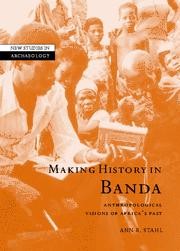Book contents
- Frontmatter
- Contents
- List of figures
- List of plates
- List of tables
- Preface
- 1 Refracted visions of Africa's past
- 2 Envisioning Africa's lived past
- 3 The past in the present: history-making in Banda
- 4 The political-economic context
- 5 Local life in the context of the Niger trade c. 1300–1700
- 6 The changing social fields of Banda villagers c. 1725–1825
- 7 The changing social fields of Banda villagers c. 1825–1925
- 8 Reflections: historical anthropology and the construction of Africa's past
- Notes
- References
- Index
- Other books published in the series
4 - The political-economic context
Published online by Cambridge University Press: 22 September 2009
- Frontmatter
- Contents
- List of figures
- List of plates
- List of tables
- Preface
- 1 Refracted visions of Africa's past
- 2 Envisioning Africa's lived past
- 3 The past in the present: history-making in Banda
- 4 The political-economic context
- 5 Local life in the context of the Niger trade c. 1300–1700
- 6 The changing social fields of Banda villagers c. 1725–1825
- 7 The changing social fields of Banda villagers c. 1825–1925
- 8 Reflections: historical anthropology and the construction of Africa's past
- Notes
- References
- Index
- Other books published in the series
Summary
The notion of the “pre-colonial” as a time “prior to impact” (Ranger 1993:69) is belied by West Africa's long-standing connections with the larger world. Trans-Saharan caravan networks linked West Africa, the Islamic Mediterranean, and, indirectly, Christian Europe from the end of the first millennium ad. Fifteenth-century Portuguese mariners pioneered sea routes, providing an artery for the flow of West African gold to Europe. Later, manufactured goods were ferried to Africa, exchanged for humans exported to bondage in the New World, where they produced raw materials for European industry. This infamous triangle of trade intimately linked the political-economic fates of four continents. Their fates were no less linked with the abolition of the slave trade and the shift to “legitimate” trade early in the nineteenth century. The partitioning of Africa at the Berlin Conference (1884–85) ushered in the relatively brief colonial period, during which the map of Africa took its present form. Growing involvement of European capital and distinctive forms of development (and underdevelopment) ensured continued links between West African nation states and the global economy in the postcolonial period. While the broad strokes of these political-economic developments are well known, their impact on the daily lives of people – especially those living in areas removed from the coast – are poorly understood.
The history of the Banda area, insignificant today from a global economic perspective, mirrors this well-rehearsed series of extraregional developments. Banda has been variably integrated into spheres of power whose geographical focus lay in different directions.
- Type
- Chapter
- Information
- Making History in BandaAnthropological Visions of Africa's Past, pp. 82 - 106Publisher: Cambridge University PressPrint publication year: 2001



